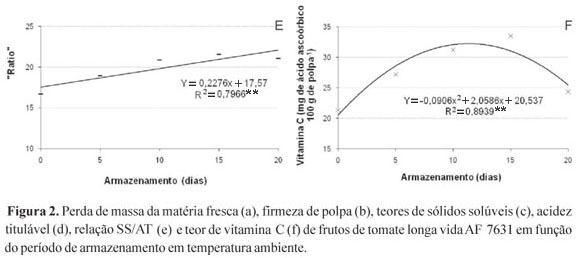The application of growth regulators can influence all plant developmental phases, including flowering, development and maturation of fruits and seeds. In this study, we evaluated the physical and chemical characteristics and shelf life of tomato fruits from plants treated with Paclobutrazol - PBZ (0, 50 and 100 mg L-1) in drench application on seedlings, at 15 days after sowing. The fruits were analyzed immediately after harvest and after 5, 10, 15 and 20 days of storage in ambient conditions. The efficiency of treatments and fruit quality were determined by the parameters of weight loss, firmness, soluble solids (SS), titratable acidity (TA), vitamin C and SS/TA ratio. The experiment was arranged in a 3 x 5 factorial completely randomized design (concentrations of paclobutrazol x days of storage). The applications of paclobutrazol on tomato seedlings, 15 days after sowing, the concentrations of 50 and 100 mg L-1 had no effect on the fruit shelf-life of tomato cv. AF 7631. Increasing concentrations of PBZ resulted in lower weight loss, firmness and acidity of fruits. Soluble solids, vitamin C and SS/TA ratio did not change with increasing concentrations of PBZ. Fruits, regardless of the PBZ concentrations applied to seedlings, reached twenty days of storage (25 ±2 ºC and 75±5% UR) fit for consumption, although with significant loss of fresh mass, acidity and firmness.
Solanum lycopersicum L; growth regulator; maturation






